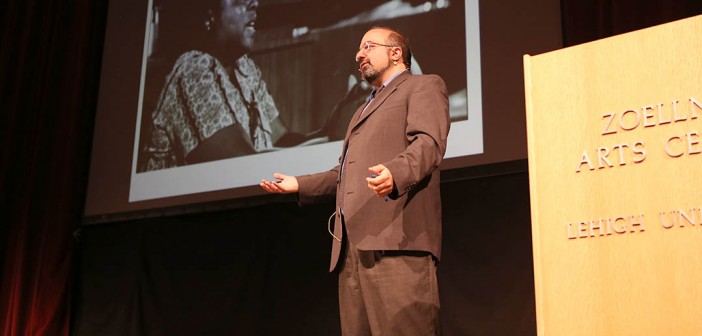A three-day conference commemorating the life and work of Malcolm X brought the Lehigh community together to discuss sociopolitical issues from the revolutionary’s lifetime that are still relevant today.
The conference, “Malcolm X’s World 50 Years Later: Reappraising Race, Religion and Revolution Today,” was held from Tuesday to Thursday on Lehigh’s campus and was sponsored by the College of Arts and Sciences.
According to Donald E. Hall, the dean of the College of Arts and Sciences, this conference continued the tradition of events sponsored by the university that pose difficult questions about the current system in which we live and how we can change it.
Visiting speakers included Hisham Aidi, a professor at Columbia University; Michael Eric Dyson, a professor of sociology at Georgetown University; and Omid Safi, the director of the Duke Islamic Studies Center at Duke University. The speakers discussed their experiences studying Malcolm X as a historical figure and how his legacy and message have impacted the world today.
Lehigh professors Saladin Ambar, an associate professor of political science and the faculty conference co-chair, and Rob Rozenhal, an associate professor of religion studies and the director of the Center for Global Islamic Studies, among others spoke and participated in panels as well.
As noted by the multitude of speakers, the legacy of Malcolm X is both intricate and multi-layered.
“I think Malcolm X falls into the category of historic figures or ideas that people think they know,” Ambar said. “Because they are somewhat familiar with him at a distance, they presume they have a handle on the subject.”
Aidi, Rozenhal and Safi discussed the significance of the X in Malcolm’s name, a change to his identity he made while incarcerated. The X represents a history of anonymity and loss, said the panel. They discussed how Malcolm was an African American Muslim, which doubled the difficulties, biases and social inequities he experienced.
Ambar noted that commemorating Malcolm X is a common tradition at other prestigious academic institutions,as well, including Oxford University, Princeton University and Villanova University.
“If you’re a serious institution, you take all sorts of moments in history and help your students and faculty engage meaningfully around the subject,” Ambar said.
The Malcolm X conference at Lehigh was structured to involve student and audience participation, especially during panels. Additionally, several of the events were filmed and live streamed on the conference page on the College of Arts and Sciences’ website.
Many conference events coincided with Lehigh classes, which drew in students from different majors.
Paras Khan, ’16, is currently taking Ambar’s course on Malcolm X, and he was interested in seeing the connections between what he has learned so far and what the different speakers had to offer.
“My professor has a lot of African American themes in the course that he takes seriously,” said Haley Miller, ’15, who was drawn to the conference because of a theater course.
Additionally, social justice was a dominant theme in the Malcolm X Conference, which many students related to the climate on Lehigh’s campus.
“I think the campus climate is decent,” Ceara Hogan, ’17, said. “The racial issues that linger from years past still play a role in the implementation of social justice on Lehigh’s campus.”
Incidents from last year, including the vandalism occurring at the Umoja House, have sparked conversation, as well.
“I know there were public instances of racism last year that would imply that our campus is very racist,” Amalia Cote, ’17, said.
Alexis Martins, ’17, agreed, saying that although Lehigh still has a long way to go in terms of creating an inclusive environment, the climate is moving in the right direction.
“I think that by having more conferences and lectures about these types of social issues, students will be inspired to make a difference,” Martins said.






Comment policy
Comments posted to The Brown and White website are reviewed by a moderator before being approved. Incendiary speech or harassing language, including comments targeted at individuals, may be deemed unacceptable and not published. Spam and other soliciting will also be declined.
The Brown and White also reserves the right to not publish entirely anonymous comments.